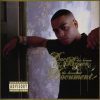Hackney-based rapper Klashnekoff has been on the UK hip hop scene for the best part of 10 years, yet this is only his third studio album. After 2007’s Lionheart showed distinct commercial leanings, this is a reconnect with his less-compromising 2004 debut, The Sagas of Klashnekoff. And that’s what causes the problems: since the first Sagas, er, saga, there’s been a progressive maturity about his music, but these new vocals have moved backwards.
Musically, this is a smartly flowing album, with variations in mood, texture and instrumentation; it avoids the vogue for obviously non-musical sounds to enjoy a warm, melodic feel. The opener inches forward with a sludgy kick drum, a swelling organ and a fractured electric guitar–it could be a modern take on Funkadelic’s America Eats Its Young. Elsewhere, it’s just as brainy: Keep It Moving and Forever More are optimistic and breezy, with synth lines for hanging out on summer days, while Shine On achieves a delicate lightness with harmony singing. Get It Too and Klash Anthem create cold, swirling soundscapes, and Cold World has a harp right in the front of the mix.
As much as the sounds and emotions provide the sense of drama, the rapping works against it, with a monotonic delivery paying no attention to what’s going on behind it. Even the one love song, Forever More, sounds like one more example of how hard life can be. Rather than enhance the lyrics, eventually this renders them meaningless. Come that stage, his one-trick life-on-the-mean-streets subject matter is just plain tired. At this point in Klash’s career it’s a lyrical angle that stretches credibility. He’s now so thin on genuine inspiration that while once he was full of righteous anger, now he sounds like a whiney teenager. As for writing songs about the injustices of the music business, they don’t cut much ice with somebody who works in a factory and who has spent real money on this album.
Ironically, what could’ve been a groundbreaking UK hip hop album has pretty much ensured it can’t succeed as anything other than a collection of club singles. That way it’ll get broken up, and few will pay attention to the vocals.
–Loyd Bradley, BBC
TRACKLIST
- 1. Church (intro)
- 10. Paper Up
- 11. Shine On (Feat. Mensah Hart)
- 12. Get It Too (Feat. Capito)
- 13. Cold World
- 14. Repping Hard (Feat. K9)
- 15. Raw (Feat. Capito)
- 2. Back To The Saga (intro)
- 3. Keep It Moving (Feat. D.Ablo)
- 4. Soon Come
- 5. Tek Time (Feat. Capito & Skriblah)
- 6. Music Game
- 7. Somebody Tell Me (Feat. K9 & Wretch 32)
- 8. Klash Anthem (Feat. D.Ablo)
- 9. Forever More (Feat. D.Ablo)

 (No Ratings Yet)
(No Ratings Yet)







